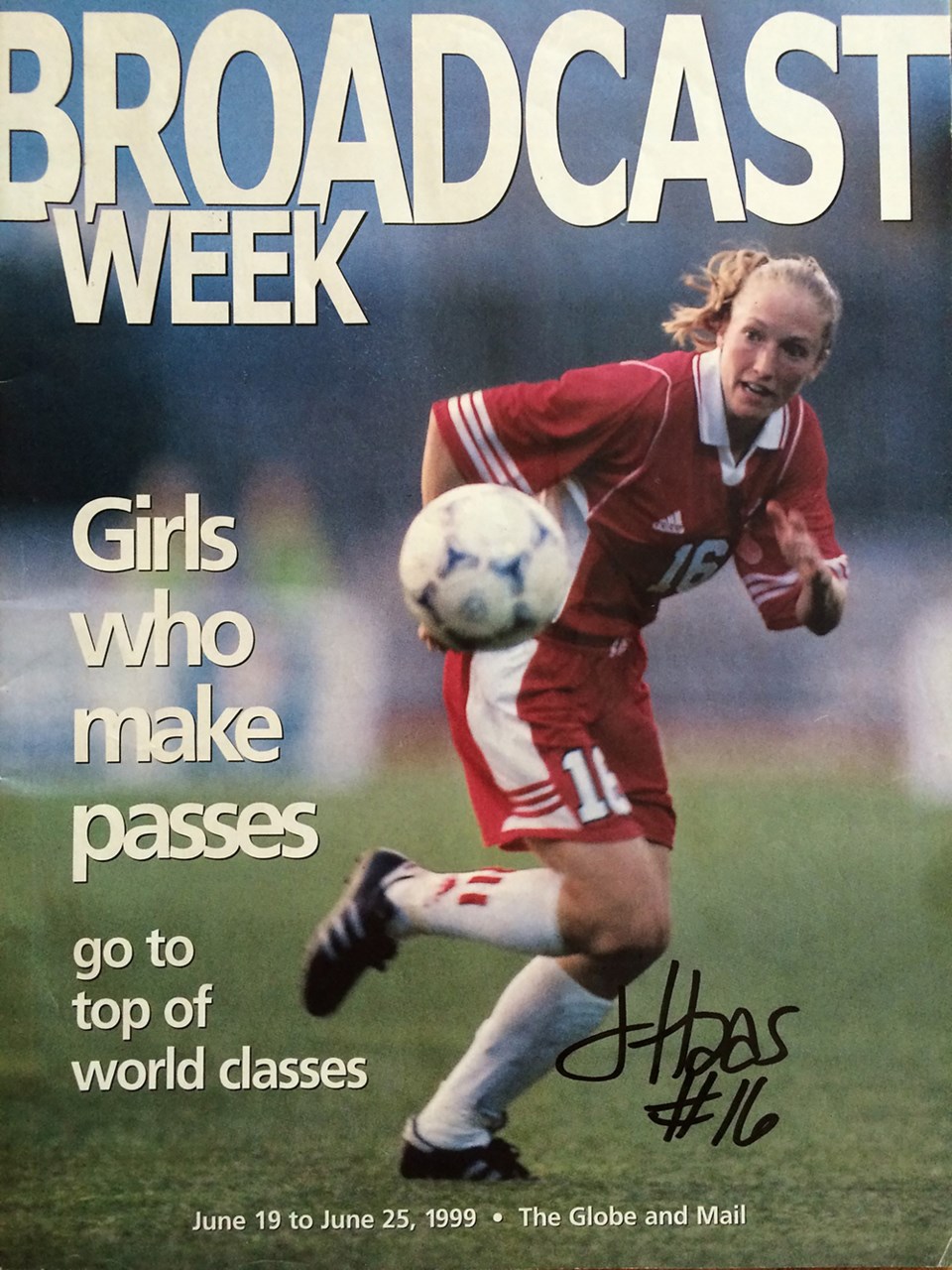With the 2023 FIFA Women’s World Cup of Soccer now underway, a qathet-region resident has fond recollections of when she suited up in national colours for the 1999 women’s world cup.
Jeannette Haas, at the time a varsity soccer player for University of Victoria Vikes, had been invited to be part of the national training pool from 1996 to 1998, attending camps at Simon Fraser University. She was a centre-midfielder for the Vikes but was moved to wide midfield for the national team, playing both sides.
“Then, in May 1999, in my final year at UVic, I was invited to the world cup camp, which was at my university, which was pretty convenient,” said Haas. “I made it through a bunch of cuts, which was pretty surprising to me.
“Then, I got to play. After I was selected, I got to play in six warm-up games for the world cup. I started quite a few of them. I think maybe there was one that I didn't start and went in halfway. But I played in all six warm-up games.”
Haas said the national team played against Mexico, twice in Vancouver, and then played against USA in the United States. The next team was Brazil, and then Haas and her teammates played two games in Ontario against Australia.
“Wow, what an experience,” said Haas. “That was just before the World Cup.”
The 1999 women’s world cup was held in the United States and Team Canada played a couple of games at Giants Stadium, now known as MetLife Stadium, in New Jersey.
For the first game, Canada played Japan. Haas said after playing in all six pre-tournament games, she ended up “riding the pine” against Japan, meaning she didn’t start the game. The teams tied.
“I got to warm up, but I never went in,” said Haas.
Next, Team Canada played Norway in Washington, DC.
“I started the game, and you know, 12 minutes in, I rolled my ankle and I had to come off the field. So that was my playing experience at the world cup, which was quite short, but a great experience.”
Haas said Canada lost “big time” to Norway and recalls that the score was 7-1.
The next opponent was Russia back in New Jersey and Haas watched from the sidelines because of her injury. She recalls the score as 4-2.
“Then, we immediately got sent home on planes,” said Haas. “There was no sticking around to take in the world cup competition. The players dispersed to all corners of Canada.”
The Americans won the title on home turf in 1999 and are favoured to win the tournament now being held in Australia and New Zealand.
In the lead-up to the 1999 world cup, Haas said she was able to meet and train with a very young Canadian superstar named Christine Sinclair. Haas recalls that Sinclair was 14 years old at the time and Canada had never had someone that young make the ranks, but Haas knew Sinclair was special.
“She could have easily played with us at that point, in my opinion,” said Haas. “She was amazing. Just like now, she could put the ball up into the top corner of the net from almost anywhere.”
Watching with pride
After the world cup, Haas’s high-level soccer playing came to an end. After having graduated from university, she wasn’t regularly playing in top-flight competition.
She said she participated in some women’s league play, but it did not keep her at the level needed to continue in national play. When she was on the national team, she could run for days at the time, but her conditioning declined after leaving, she added.
Haas said the skill level of the Canadian team has increased markedly, “which is amazing.”
“The opportunities for women to play professional soccer are much more common,” she added.
It was also more difficult for players back then. Haas said she did not receive any financial support.
“I had a job and could barely afford my rent,” said Haas.
She was invited back to try out for the national team, but because she had not been playing high-level soccer, she was not able to play at another world cup.
She said the national team back in the 1990s came together for a brief time, so team building was difficult. Now, players have more time to play together as a team and have much better supports, such as psychological, to help them elevate their games, she added.
“Teams today just have more opportunities to play together longer,” said Haas. “It seems to me that the national team is regularly playing together, practicing, and is working toward team cohesion. Women nowadays, they're so good.”
Haas said she was very proud to wear the Canadian jersey and represent the country. She will maintain that pride while she watches the Canadian women vie for the world title Down Under.
Canada played to a 0-0 tie with Nigeria in its first match at the 2023 World Cup of Soccer on July 20. The team faces Republic of Ireland on July 26. The final match in Group B pits Canada against host Australia on July 31.
Join the Peak's email list for the top headline right in your inbox Monday to Friday: prpeak.com/account/mailinglist.





